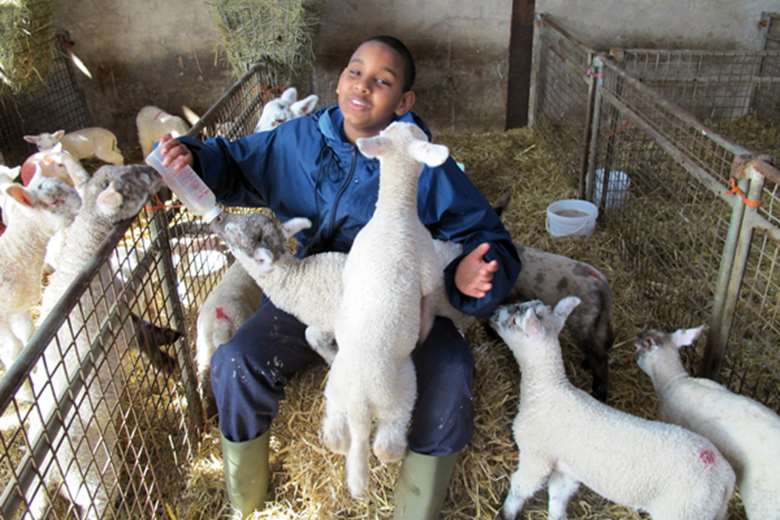Jamie's Farm
Emily Rogers
Tuesday, May 10, 2016
Residential project connecting young people at risk of exclusion with farming and animals, to improve self-esteem, soft skills and behaviour at school.

- Offers an intensive programme of "family, farm and therapy" in Wiltshire and Herefordshire for 11- to 16-year-olds at risk of exclusion
- Groups of up to 12 are given real farm jobs in a five-day residential, designed to improve self-esteem, school engagement and behaviour and develop the soft skills and attributes needed for success at school and beyond
- Pupils live within a supportive "family" of staff and peers and participate in one-to-one and group work, helping them verbalise feelings, address the causes of their behaviour and develop self-belief
ACTION
Jamie's Farm was sparked by teacher Jamie Feilden's boyhood passion for farming. "As someone who struggled in the classroom, farming was a great outlet for me and gave me wonderful opportunities for achievement, with real, tangible results," he remembers.
When teaching in Croydon, Feilden became aware of the dearth of such opportunities for disadvantaged pupils, driving him to develop the programme with his psychotherapist mother Tish. They welcomed the first pupils to their farm in 2005, launching Jamie's Farm as a charity in May 2009. The charity has now helped around 3,000 children from across England, thanks to its purchase of Hill House Farm in Wiltshire in 2010 and Herefordshire farm Lower Wernddu, which opened in January last year.
Schools pay £6,000 - around one third of the total cost - for 10 to 12 pupils, plus two or three staff to attend. Jamie's Farm helps schools select participants, plan group dynamics, and decide on the accompanying staff, who will be crucial in supporting pupils back at school.
Referral triggers include low engagement and attendance, low self-esteem, challenging behaviour and negative relationships. A Jamie's Farm worker visits schools two weeks before the residential, with enticing videos of programme activities. "Children sense from this first contact that this is someone focusing on the positives, who sees them as an individual," explains Tish Feilden, who is the programme's lead therapist. "We want children to immediately see this as somewhere recognising their uniqueness, where they feel part of a family."
Pupils sign contracts agreeing to give up phones, sweets, fizzy drinks and cigarettes at the farm. They start their day feeding animals, mucking out pig pens or making breakfast, in pairs or threes. After breakfast, seasonal tasks include looking after animals, lambing, gardening and harvesting vegetables. The tasks help them develop empathy, confidence and the ability to follow instructions.
"We're trying to put them in the state of mind where they're not fazed by challenges," explains programme manager Jake Curtis. "They're learning about themselves and what it takes for them to be successful in this environment."
Regular meals around the farmhouse table incorporate group activities to develop self-expression. Participants share experiences, supporting each other through "shout outs" for achievements or contributions, which Tish Feilden says builds a "culture of generosity, awareness and connection". Halfway through their stay, they write a postcard to their future selves, describing what personal skills, qualities or lifestyle changes were behind their farm successes and resolving to transfer these to situations at home or school.
Participants have one-to-one daily catch-ups with the farm's therapeutic co-ordinator, exploring how their personal stories have influenced their behaviour and discussing support and coping strategies. Through therapeutic work with horses, they gain understanding of how their attitude and demeanour affects others. "When children are in fight-or-flight mode, the horse doesn't want to be anywhere near them," explains Tish Feilden. "But when they feel grounded, safe, calm and controlled, horses will be very receptive."
A country walk every afternoon builds confidence, often through unexpected lessons. A recent 10-strong group herded 100 sheep for a mile, a feat requiring careful teamwork, communication, focus and courage.
On the penultimate day, Jamie's Farm and school staff compile an action plan for each child, before a final-day celebration event. A charity representative visits pupils six weeks after their return, keeping memories alive and catching up on progress. In London, follow-up work takes place at Oasis Farm Waterloo, which the charity co-runs with community organisation Oasis Hub Waterloo.
IMPACT
The charity's impact report covering September 2014 to April 2015 outlines school data showing 88 per cent of a sample of 100 participants increasing their self-esteem within six weeks, 61 per cent engaging better with school and the same proportion improving their behaviour.
Of 12 girls visiting from a school in Caterham in July 2014, three of the four who had poor school attendance had improved this one term later. Meanwhile, seven who had fixed-term exclusions in the year before visiting had none in the six months after. Their average number of bad behaviour incidents numbered 6.5 before visiting, but dropped to 2.75 six weeks later. And 10 were on track in core subjects six months after the visit, compared with seven beforehand.
Among the success stories is 15-year-old Callum, visiting from a west London pupil referral unit in September 2013. He successfully nurtured four piglets with an ill mother through their first week, naming each after a family member, and transformed his social interactions through sharing his inner strength with a horse. Teachers were overwhelmed by his transformation in confidence, attitude and ability to form relationships, putting him on track for mainstream education.
This practice example is part of CYP Now's special report on outdoor learning. Click here for more




